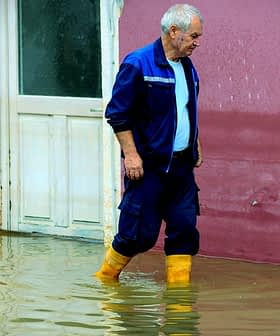Report Warns of Impacts of Climate Change in Asia
The Asian Development Bank cautions that human health and food security in the Asia Pacific region are under threat if steps are not taken to tackle climate change.
A report published by the Asian Development Bank (ADB) this month warns of the consequences of global warming in the Asia Pacific region.
Titled “A Region at Risk: The Human Dimensions of Climate Change in Asia and the Pacific,” the study is a collaboration between the Manila-based ADB and the Potsdam Institute for Climate Impact Research (PIK).
Asian countries hold Earth’s future in their hands. If they choose to protect themselves, they will help to save the entire planet.
The ADB warned in a press statement that “the global climate crisis is arguably the biggest challenge human civilization faces in the 21st century, with the Asia and Pacific region at the heart of it all. Home to two-thirds of the world’s poor and regarded as one of the most vulnerable regions to climate change, countries in Asia and the Pacific are at the highest risk of plummeting into deeper poverty — and disaster — if mitigation and adaptation efforts are not quickly and strongly implemented.”
The report cautions that progress made in economic development and improved living standards in the region can be easily undone if steps are not taken to curb emissions and dependence on fossil fuels. Without these changes, climate change has the potential to cause increasing temperatures, a rise of the sea-level, disruption in rainfall patterns, and extreme weather patterns and floods across Asia. These effects can have human costs in the form of crop damage, strained livelihoods and the need for food imports.
The 131-page report starts with an introduction to the Asia Pacific region and its geography, people and economy as a background to understanding the potential impacts of climate change on the region. This is followed by a section examining these impacts, and specifically the changes in temperatures, precipitation, sea-level rise, hydrology, the incidence of cyclones, and flooding risks that can be expected. The last part covers the human costs of climate change and in particular its impact on human health, urban areas, security, migration and trade networks.
The study concludes that even if the Paris temperature goals are met (i.e. by limiting global warming to 1.5°C to 2°C), some ecosystems and socioeconomic sectors in the region will still be affected, while no change at all will have severe effects on livelihoods, human health, migration, and the potential for conflicts.
The possible solutions suggested to mitigate climate change in the Asia Pacific region are those outlined in the Paris Agreement. These include rapid decarbonization, adaptation measures to protect the most vulnerable, projects focussing on renewable energy, and innovation in infrastructure and transport.
Hans Joachim Schellnhuber, director of the Potsdam Institute for Climate Impact Research and the report’s co-author, cautioned that “The Asian countries hold Earth’s future in their hands. If they choose to protect themselves against dangerous climate change, they will help to save the entire planet. The challenge is twofold. On the one hand, Asian greenhouse-gas emissions have to be reduced in a way that the global community can limit planetary warming to well below 2 degrees Celsius, as agreed in Paris 2015.”
“Yet even adapting to 1.5 degrees Celsius temperature rise is a major task,” Schellnhuber added. “So, on the other hand, Asian countries have to find strategies for ensuring prosperity and security under unavoidable climate change within a healthy global development. But note that leading the clean industrial revolution will provide Asia with unprecedented economic opportunities. And exploring the best strategies to absorb the shocks of environmental change will make Asia a crucial actor in 21st-century multilateralism.”
In an effort to combat climate change in the region, the ADB dedicated $3.7 billion in 2016, an amount that will reach $6 billion by 2020.








